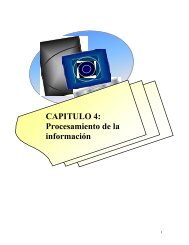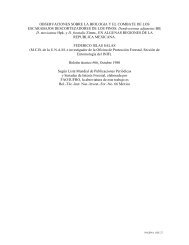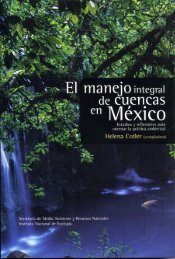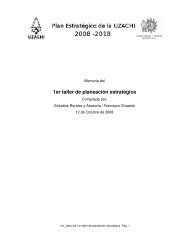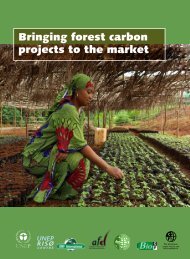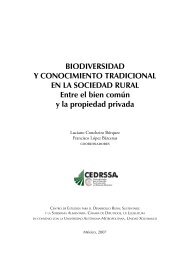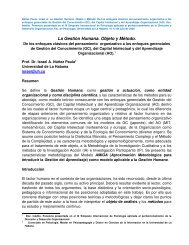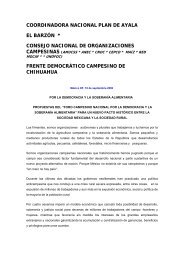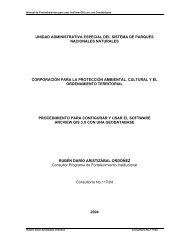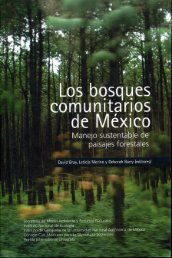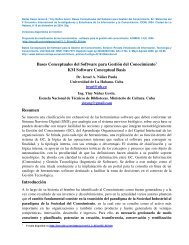STATE OF THE WORLD's INDIGENOUs PEOpLEs - CINU
STATE OF THE WORLD's INDIGENOUs PEOpLEs - CINU
STATE OF THE WORLD's INDIGENOUs PEOpLEs - CINU
- No tags were found...
You also want an ePaper? Increase the reach of your titles
YUMPU automatically turns print PDFs into web optimized ePapers that Google loves.
EMBARGOED UNTIL 14 January 2010<strong>STATE</strong> <strong>OF</strong> <strong>THE</strong> WORLD’S INDIGENOUS PEOPLESNot for distributionGrisi siknis in NicaraguaFor centuries, grisi siknis (also called pauka alkan) has been a syndrome that occurs occasionally in theMiskitu communities of the Caribbean Coast region of Nicaragua. The first case recorded by Europeanswas in 1881, in which most of the victims were young women, with some rare cases in men. The symptomsobserved included a loss of senses, believing they had had sexual relations with spirits, and people runningfrom their houses. The syndrome has an epidemic pattern; it is highly contagious and can affect a largenumber of people within a specific community simultaneously. According to the indigenous Miskitu andMayangna worldview, a lack of happiness and socio- environmental well-being is related to being “sick”.Based on this life philosophy, the grisi siknis is considered a state of illness. In the Miskitu culture, thereare spirits in the forms of elves, mermaids, spirits of the dead and the owners of the mountains, rivers andhills. They are part of the way of life of the communities with whom they coexist. There are several reasonsthat this co-existence is broken and causes the imbalance. When this happens, the spirits cause sickness.Only traditional healers can cure grisi siknis.Source: Davis (2006)Intercultural health systemsIn most state health systems, the cultures and world views of indigenous peoples are ignored, dismissed or activelyopposed. Instead, most states promote monocultural health systems based exclusively on Western medicine,which do not fully reflect the multiple cultures and ethnicities of that state. This monoculturalism marginalizesindigenous peoples, denying them access to basic health services and devaluing their traditional health systems.In order to evaluate the extent to which governments are meeting the health needs of indigenous peoples, thedegree to which indigenous health systems are respected and integrated into the state health systems must thusalso be examined. Most health systems can be classified as monocultural, multicultural or intercultural. 73Monocultural health systems are based on a concept of society being homogeneous, and privileging thedominant national culture over all other cultures. There may be nominal acknowledgement of ethnic, linguisticor cultural diversity but the design of policies and programmes, including the allocation of resources, does notadequately reflect this reality. For example, in monocultural systems, data collection is not attuned to ethnic orcultural differences and may not identify health issues that are determined by gender, socio-economic class orethnicity. Furthermore, the education of health practitioners is based on a biotechnological approach and ignoresthe contributions of indigenous cultures. Few health personnel are qualified to work in multiethnic contexts andthe development and distribution of human resources is not culturally relevant. In these monocultural healthsystems, decisions are centralized at the top, without the systematic participation or consultation of indigenouscommunities.Multicultural (or pluricultural) health systems, in contrast to monocultural ones, welcome and promote thepresence of different cultures in society, including their respective beliefs, customs, practices and ways of life.This degree of recognition of diversity is still insufficient if it fails to ensure equality among those cultures or topromote mutual learning.73For a classification and description of monocultural, multicultural and intercultural systems, see Cunningham (2002).176 | CHAPTER V



